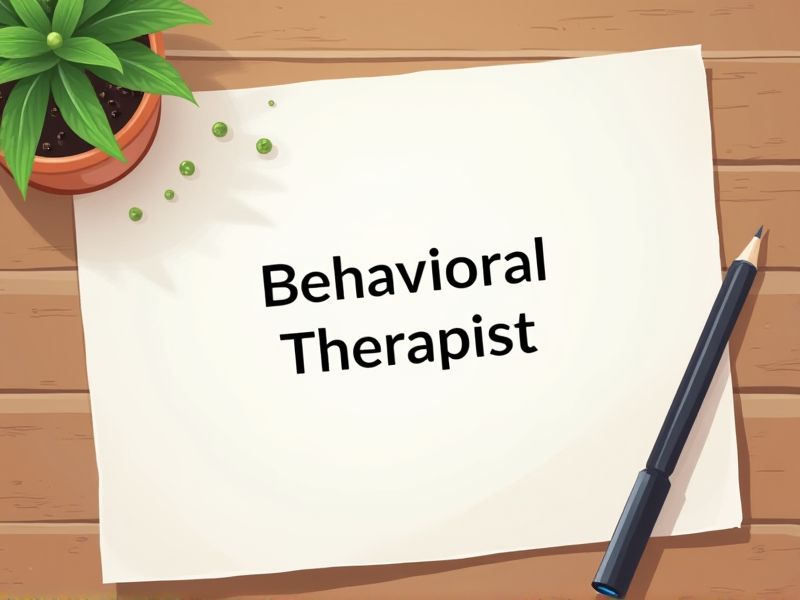
Behavioral therapists address complex psychological and emotional issues, requiring a deep understanding of human behavior. Acquiring specific certifications ensures they possess the necessary skills and knowledge to deliver effective treatment. Certification also demonstrates a commitment to professional development and adherence to industry standards. Here are some essential certifications you might need as a behavioral therapist.
Board Certified Behavior Analyst (BCBA)
A Board Certified Behavior Analyst (BCBA) provides specialized expertise in assessing and interpreting behavior using evidence-based methodologies. Their certification ensures adherence to professional standards, crucial for devising effective intervention plans. Data-driven strategies employed by BCBAs enhance therapeutic outcomes, especially for individuals with autism and other developmental disorders. Continuous supervision by a BCBA contributes to consistent progress tracking and necessary adjustments in therapy.
Board Certified Assistant Behavior Analyst (BCaBA)
A BCaBA provides essential support in creating and implementing behavior intervention plans, ensuring consistency and effectiveness in therapeutic outcomes. Their certification ensures that they have a foundational understanding of applied behavior analysis principles, which enhances the overall treatment quality. Having a BCaBA on board allows more comprehensive data collection and analysis, enabling adjustments in real time. This role also assists in managing increasing caseloads by providing additional oversight and intervention, maintaining high standards of care.
Registered Behavior Technician (RBT)
RBTs provide critical support by implementing behavior intervention plans designed by behavioral therapists, which increases the efficiency of treatment. By handling day-to-day interactions with clients, RBTs enable therapists to focus on assessments and treatment planning. Consistent data collection by RBTs helps therapists make informed decisions, ensuring more accurate adjustments to therapy approaches. Their involvement reduces the overall workload for therapists, allowing for improved client outcomes through focused expertise.
Certified Autism Specialist (CAS)
Being a Certified Autism Specialist equips a behavioral therapist with enhanced knowledge and skills to address the unique needs of individuals with autism. This certification ensures the therapist is up-to-date with best practices and evidence-based interventions. A CAS credential can increase the therapist's credibility and trust among clients and families seeking specialized care. Access to a professional network and resources improves the therapist's ability to make informed decisions and provide effective support.
Certificate in Cognitive Behavioral Therapy (CBT)
A Certificate in Cognitive Behavioral Therapy (CBT) equips behavioral therapists with specialized skills to effectively address and modify maladaptive thinking patterns in clients. This certification often enhances a therapist's credibility, potentially leading to greater trust from clients and employers. Training in CBT techniques allows therapists to offer evidence-based interventions, increasing the potential for successful outcomes when managing conditions like anxiety and depression. Acquiring such certification typically aligns with ongoing professional development, ensuring therapists remain current with best practices in the field.
Trauma-Focused Cognitive Behavioral Therapy (TF-CBT) Certification
Obtaining a TF-CBT certification ensures a behavioral therapist has specialized knowledge to address trauma-related psychological issues effectively. This certification can increase a therapist's credibility and can lead to better treatment outcomes for clients undergoing trauma recovery. Specialized training provided in the certification helps therapists apply healing strategies that are empirically supported and tailored to individual client needs. In a competitive mental health field, certification can differentiate therapists, expanding their professional opportunities and client base.
National Certified Counselor (NCC)
Obtaining the National Certified Counselor (NCC) credential ensures that a behavioral therapist meets national standards for knowledge and ethics, enhancing trust from clients and employers. The credential may increase job opportunities and potential for higher pay, as some agencies and employers prefer or require nationally certified counselors. Holding the NCC can also provide access to a professional network and continuing education resources, which are valuable for career development and staying informed about the latest therapeutic practices. The NCC designation supports a behavioral therapist's commitment to maintaining best practices, which can contribute to improved client outcomes.
Certified Mental Health Counselor (CMHC)
Certified Mental Health Counselors provide structured, accredited training and experience, essential for effective behavioral therapy, ensuring therapists meet professional standards. They bring evidenced-based techniques into practice, boosting intervention outcomes significantly. CMHCs hold specialized certifications that contribute to tailored therapeutic strategies addressing diverse client needs. Their regulated status ensures ethical practices, safeguarding client well-being and promoting trust in therapeutic relationships.
Licensed Professional Counselor (LPC)
Licensed Professional Counselors (LPCs) possess specialized training required to address a range of behavioral issues effectively. Their expertise in therapeutic techniques enables them to assess and develop tailored intervention plans. LPCs' credentials also ensure they adhere to professional standards of practice and ethics, guaranteeing quality care. With their comprehensive understanding of mental health frameworks, they can collaborate with other healthcare professionals to provide holistic treatment.
Advanced Certificate in Applied Behavior Analysis (ABA)
Behavioral therapists often need an Advanced Certificate in Applied Behavior Analysis (ABA) to deepen their understanding of behavior modification techniques backed by empirical research. This certification enhances their skills in assessing and implementing data-driven interventions, which improves client outcomes. Demand for ABA-qualified professionals increases as evidence-based practices become more essential in treating autism and other behavioral disorders. This specialized training also ensures therapists adhere to ethical guidelines, safeguarding the client-therapist relationship.
Summary
You can expect enhanced credibility and trust from clients when a Behavioral Therapist obtains certifications. Certifications often lead to broader career opportunities, allowing you to access specialized roles within the field. With recognized qualifications, you might also command higher compensation due to perceived expertise. Certified therapists typically experience increased professional development, staying current with evidence-based practices.
